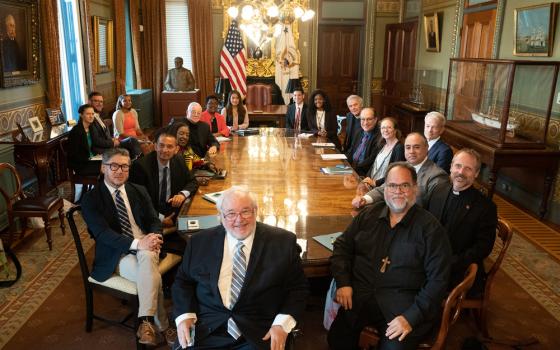People who think debates don't matter need to do their history. In the race that most closely resembles the current one, Ronald Reagan had been painted as an irrational extremist by the campaign of Jimmy Carter. (Sound familiar?) When they had their debate, Reagan was calm, cool and collected. He made himself appear acceptable and erased the doubts the fence sitters had. He went on to win in a landslide.
There are micro and macro issues in any debate. The micro issues are those that will be replayed in the next couple of days, a major gaffe (Gerald Ford declaring there was no Soviet domination of eastern Europe), a non-verbal cue that leaves a dominant impression about a person's character (Al Gore's sighs or George H.W. Bush looking at his watch), or a put down that resonates (Senator, you're no Jack Kennedy"). Sometimes an impression leads to a macro issue, as when Ronald Reagan's off-night at his first re-election debate raised questions about his age, questions he put to rest with a slam dunk response in the second debate, saying he would not raise Mondale's youth and inexperience against him. Tonight, no one knows what to expect, but we can classify our expectations into two categories, those micro issues that will dominate news coverage and those macro issues that might be reinforced or diminished by tonight's contest.
First, the micro issues. Hillary Clinton's greatest opportunity will be to catch Donald Trump pretending he knows what he is talking about, and doesn't. It is not in his nature to admit that he is at a loss, and he sometimes digs himself into a deeper hole. In such situations, he may reach for a falsehood; he may try and change the topic; he may simply keep repeating the falsehood in the hopes that repetition will confer facticity. Most likely, he will give a vague answer. In the face of his vagueness, Clinton has to be willing to say, over and again, "Mr. Trump, tell us how you will accomplish this. Take all the time you need. You can have my time too until the American people get an answer. How?" In the face of falsehoods, Lester Holt has to do right by our profession. As E.J. Dionne asked in his column this morning, if journalism isn't about getting the facts right, what's the point?
This opportunity to challenge Trump also carries a significant risk for Clinton because she must not appear schoolmarmish or, worse, condescending towards Trump's supporters as opposed to Trump himself. (My use of the adjective schoolmarmish is not sexist. I applied it to Al Gore and John Kerry too.) The person who spoke about a "basket of deplorables" needs to be left in Westchester. As well, the self-pitying Clinton should best not show up: During her first interview with running mate Sen. Tim Kaine, she spoke about how she has always been subjected to a double standard. The people watching agree there is a different standard for Clinton, but know that it works for her as well as against. Last time I checked the mail, there was no invitation to give a talk to Goldman Sachs for a quarter of a million dollars.
Donald Trump's biggest opportunity is to demonstrate an ability to articulate some policy goals with a reasonably accurate description of how to attain them. The bar has been set very low for him. He does not need to be overly specific, nor historically informed, nor candid about the obstacles. Trump is better than Clinton at saying, "We need to do X because our failure to do so is causing this or that specific harm," but he is not good at adding, "just as President Reagan did in 1983" or "and we can achieve that goal by passing legislation that will do these three things."
Trump's biggest worry has to be that his inner fascist will come bubbling out. Remember when, at a rally, he pointed to a black man in the crowd (and there was only one) and referred to the man as "my African-American"? Or, the time he launched his campaign by saying of Mexicans: "They're bringing drugs. They're bringing crime. They're rapists, and some, I assume, are good people." Worse would be if Clinton provokes him to defend his absurd proposals to build a wall or deport 11 million undocumented immigrants with a similar locution, tainting both his character and his policy and showing the link between the two. It would not be bad if Trump is made to look like a liar with something to hide regarding his refusal to release his taxes, but scratching the fascist itch in public, so it can be replayed time and again, could be fatal.
The macro issues that will be nourished or negated by the debate are serious, as I think most people will allow, but they keep failing to garner the attention they deserve because of Trump's ability to dominate and then change the news cycle. I have long argued that Clinton's campaign made a mistake leading with the issue of Trump's fitness for office, which is a decision for the voters to make and, in any event, is a closing argument not a starting one. But the fact is the man is not fit for office. Why, then, has he gotten this far? What does his success tell us about the state of the nation?
We Americans like to think of ourselves as exceptional, but the macro issues in this presidential election are remarkably like those in the United Kingdom's referendum on whether or not to leave the European Union. In the wake of that election, Professor Anna Rowlands of the University of Durham published a very smart essay at the Australian Broadcasting Corporation's "Religion & Ethics" blog. (Take the time to read the whole thing.) Commenting on an essay by the late Tony Judt, written 20 years prior, and applying it to the Brexit vote, Rowlands writes:
But Judt did see the real possibility of an emboldening, not so much of a civic nationalism rooted in institutions, but of an ethno-nationalism of blood and soil, which appeals to many of those who feel themselves to be outside of -- or to despair of -- civic institutions. Once emboldened by elite and opportunist political leaders (who understand few of these political undercurrents and are unlikely to be its victims, and whose hubris is to imagine their leadership will be respected by such groups) this particular breed of nationalism is a truly terrifying force, a sterile and negative political force nonetheless capable of very great harm. The considered political response to the gradual polarisation of our political culture was to ask a binary question, and then be pained when the fault lines emerge in sharp relief, and simmering sentiments of racial hatred break into the open.
Of course, presidential elections are always binary in the end, but Rowlands' observation about the "pained" surprise that the fault lines emerge and the racial hatred breaks forth sounds very applicable to the presidential contest, no? Those who have assured us that their criticisms of President Obama had no racial aspect have been proven wrong: A little bit more than 40 percent of the American people are quite comfortable expressing support for someone who has moved past dog whistles in racial politics to openly dabbling in racist tropes. This may shock the Democrats, but I do not think it should have surprised the GOP leaders.
Rowlands then pens a sentence which it is hard to believe was not written about the Clinton campaign:
In the face of this kind of political emotion, the lacklustre Remain campaign focused on jobs and economic security, but it did not connect or inspire with a robust vision of the good nor did it name the humiliation and dehumanisation many feel and seek to explain how a genuine European Union could take this up into its own political core and offer new forms of participation. To rephrase the late Judt: 'Just as an obsession with "growth" has left a moral vacuum at the heart of some modern nations,' so the abstract quality of the idea of Europe presented by Remain proved insufficient. 'The mere objective of unification is not enough to capture the imagination and allegiance of those left behind by change.'
The Democrats generally, and Clinton specifically, tend to discount the importance of any data or values that they do not share. I am not a betting man, but you can bet on the proposition that Clinton will talk about her plans to make college affordable and neglect to add any mention of what can or should be done for those who are not going to college. And then they wonder why they are not doing better among non-college educated white males.
Sadly, tonight's debate, like the entire political season so far, will not get America out of our political nightmare. It is important to remember that the failure of the political class, in both parties, has gotten us to the point where Donald Trump is plausible, and that is not a good point to be at. We Catholics are called to be a people of hope (cf. 1 Peter 3:15), but this year has given us few reasons to be hopeful about the state of our society. So, I shall close with a final quote from Professor Rowlands that, as if venturing into the cloud of unknowing, finds the possibility of hope in ways I have not been able to so far:
What and who (who on earth?) will enable us to recognise the devastation of our political culture -- a devastation many years in the making -- but do so in such a way that we are also able to recognise the fragile possibility of the new political community that might already be buried alive underneath the rubble? This is ground that a new generation of political and church/religious leaders must speak to: leaders that we are calling forth from where, and how? This is territory wide open for those with ears to hear and eyes to see.
[Michael Sean Winters is NCR Washington columnist and a visiting fellow at Catholic University's Institute for Policy Research and Catholic Studies.]






